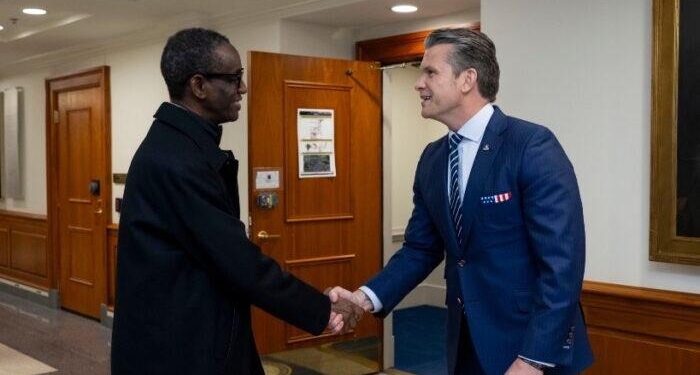The United States and the Nigerian government have agreed to establish a Joint Working Group to coordinate a new phase of defence and security cooperation, following high-level engagements between both countries in Washington, D.C., last week.
This was disclosed in a statement issued on Monday by Special Adviser to the President on Information and Strategy, Bayo Onanuga, who said the talks reinforced “a constructive and solution-driven partnership” and corrected what Nigeria described as damaging misconceptions about its internal security situation.
According to the statement signed by Onanuga, the Nigerian delegation led by National Security Adviser Nuhu Ribadu used every meeting in Washington to refute allegations of a state-sanctioned or religiously targeted genocide in Nigeria.
“The delegation strongly rejected wrongful framing of the situation,” Onanuga quoted officials as saying, stressing that “violent attacks affect families and communities across religious and ethnic lines.”
U.S. commits to deeper defence support
Following the engagements, Onanuga said the U.S. Government expressed readiness to expand its security cooperation with Nigeria.
This includes enhanced intelligence sharing, faster processing of defence equipment requests, and possible access to excess U.S. defence assets, subject to availability, to support Nigeria’s operations against terrorists and violent extremist groups.
“The United States Government affirmed its readiness to deepen security cooperation with Nigeria,” Onanuga said, adding that Washington also signalled willingness to provide humanitarian assistance to affected communities and technical support for strengthening early-warning systems.
- Both countries agreed to immediately operationalise a non-binding cooperation framework and set up a Joint Working Group to coordinate the next steps.
- The platform will ensure streamlined intelligence collaboration, clearer defence engagement channels, and more structured humanitarian and crisis-response coordination.
- Nigeria, in turn, reaffirmed what Onanuga described as its “commitment to strengthening civilian protection measures” as security agencies intensify operations against extremist groups.
Correcting misconceptions and reinforcing trust
Onanuga said the Washington discussions “provided ample opportunity to correct misconceptions about Nigeria” and helped “reinforce mutual trust” between Abuja and Washington.
He noted that the Federal Government remains aware of heightened global sensitivities regarding religious freedom and insisted that Nigerians should be assured that “firm, urgent, and coordinated steps are being taken to secure the nation.”
Members of the Nigerian delegation included Attorney General of the Federation Lateef Fagbemi; Inspector General of Police Kayode Egbetokun; Chief of Defence Staff General Christopher Musa; Chief of Defence Intelligence Lt. Gen. Emmanuel Parker Undiandeye; Special Adviser to the NSA Idayat Hassan; and Ambassador Ibrahim Babani, Director of Foreign Relations at the Office of the NSA.
Backstory
President Donald Trump had earlier this month fired several salvos against Nigeria with claims of an ongoing Christian genocide in the country, which the Nigerian government vehemently denied.
Trump also designated Nigeria as a “Country of Particular Concern,” and thereafter threatened military action in Nigeria should the government fail to address the insecurity issues.
Nigerian officials have consistently disputed Trump’s claims, insisting the security crisis is driven by criminality, extremism, and land-related conflicts, not religious persecution. The high-level meetings in Washington were partly aimed at clarifying this position to U.S. policymakers.












